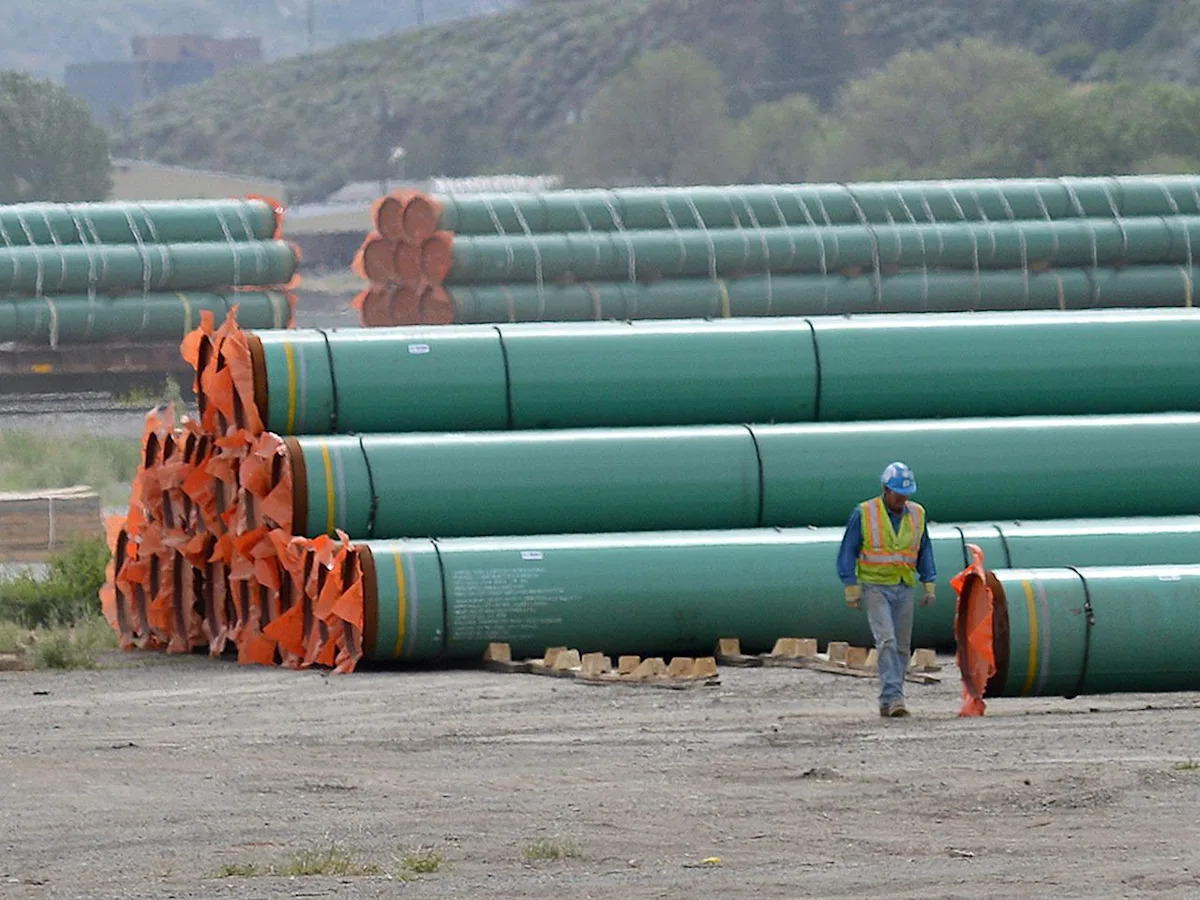This week saw Alberta Premier Danielle Smith officially propose a second oil pipeline to the West Coast. The last major attempt at something like this — the Enbridge Northern Gateway pipeline — fell apart in 2016 after concerted opposition from environmental and Indigenous groups.
But Smith’s proposal is different for a few reasons. One, she’s proposing that it be a government project. Two, the federal government is openly soliciting projects of “national interest” to boost GDP. And three, she’s saying that if Ottawa doesn’t give her a pipeline she’ll just turn around and sell more oil to the U.S.
In Dear Diary, the National Post satirically re-imagines a week in the life of a newsmaker. This week, Tristin Hopper takes a journey inside the thoughts of Smith’s proposed oil pipeline.
Monday
The maintenance of a national economy can be a tricky business. You pour billions of dollars in subsidies into foreign-owned battery plants, only for many to immediately go bankrupt. You jack up immigration to unprecedented rates in a bid to boost GDP, only for it to yield a cascade of knock-on consequences in housing and unemployment. You spend decades integrating your economy with a wealthy neighbour, only for said neighbour to betray you with tariffs and annexation threats.
However, I come to you today with a plan: A surefire plan to boost GDP, create jobs and arrest the decline in Canadian capital flight and productivity. I call it: Oil. It’s a black, hydrophobic liquid chemical composed of the remains of prehistoric plankton.
It is a resource that is both extremely valuable and extremely abundant in this country. And so, as you review bold plans to grow your national prosperity, I put it to you: Have you considered selling more oil?
Tuesday
“What use to me are these hydrocarbons?” you may ask. “You can’t drink it, you can’t eat it and it is of limited aesthetic value.”
And to this I say; you are correct on all three, my friend. If someone offers you a bitumen cocktail, you tell them “no.” If they offer you petroleum to fill your birdbath or swimming pool, you tell these charlatans “I will stick with water, thank you very much.”
But what if I told you that, with a little processing, these hydrocarbons can be transformed into propane, diesel, kerosene, naphtha, butane: Energy-dense liquids that can power everything from a humble lighter to a supersonic fighter jet. Yes, hydrocarbons can even produce gasoline; the miracle fuel that powers millions of automobiles every single day.
In fact, it is the *only* way to produce gasoline. Yes, that’s right: the Roman god Vulcan himself could not hope to move your Volkswagen or Mazda without oil.
Wednesday
But how to sell this oil to the people who want it? Should we employ workers to cup the oil in their hands and carry it direct to the customer? Perhaps we could bring this oil to market via some kind of national bucket brigade?
You’re on the right track. But I ask you to think bigger. Why sell one bucket of oil when we can sell … billions.
And that’s where I come in. I am a pipe, you see. A cylindrical piece of hollow metal of indeterminate length. Think of me like a giant straw: A subterranean aqueduct with one end at the oil’s source, and the other connected to the oil’s eager and grateful buyers.
Did you take a shower today? Flush a toilet? Grab a glass of water from the kitchen? Congratulations; you have been a beneficiary of the miracle of pipes. But what if instead of yielding a refreshing glass of water, there existed faucets that could produce endless streams of the miracle liquid of which I’ve been speaking?
Thursday
You would be forgiven for thinking this all sounds too good to be true. Untold wealth and prosperity, and all for merely tapping an ocean of black muck that lies unseen beneath our feet.
I don’t deny my plan has critics. “Why don’t we leave the black muck where it lies,” they say “A pox on the muck!”
The muck’s ignition is polluting. It alters our very environment. Use of the muck distracts us from more virtuous endeavours. They say the trade in muck will bring increased marine traffic to our shores, imprisoning our precious wildlife under a floating superhighway of steel hulls.
But can I tell you a secret? This oil is not ours alone. It is to be found in lands around the world; anywhere that once hosted a prehistoric sea is now privy to its own subterranean stores of hydrocarbons.
Would you believe, dear listener, that none of these other peoples have entertained the possibility of leaving their oil where it lies?
Friday
Ladies and gentlemen, I am but a simple pipe: A humble array of welded steel tubes equipped with pumps and transfer stations to move liquid product across long distances.
But there is one thing I do know: Your people sit atop oceans of black slurry that the wider world desires more than almost anything else. Canada can be proud to produce so very many riches: Gold, uranium, grain, beef, lentils, nonthreatening pop stars. And yet much of its most valuable resource lies curiously idled.
I hear all your calls for economic growth, for jobs, for trade diversity, for an export market less dependent on a fickle and unpredictable United States. And while I understand the impulse to address these issues with bold and exciting plans for homegrown auto manufacturing or futuristic alternative fuels, I offer an alternative: Why don’t you take your giant pile of natural resources that literally everyone wants and just sell more of that for awhile?
